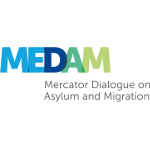
Mercator Dialogue on Asylum and Migration
The Mercator Dialogue on Asylum and Migration (MEDAM) is an international Research Alliance that aims to generate new research to inform European policy debates on asylum and migration. Funded by the Mercator Foundation, MEDAM comprises the Institute for the World Economy in Kiel; the European Policy Centre (EPC) in Brussels; and the Migration Policy Centre (MPC) of the European University Institute (EUI) in Florence.
Within MEDAM, MPC researchers are leading research on two themes:
Migration, foreign aid, and development: What are the links?
How does economic development in poor countries affect international migration? An apparently well-established ‘stylized fact’ suggests that the relationship between economic development and emigration follows an inverted U-shape pattern – i.e. emigration first increases and then decreases as a country experiences economic development. According to this “hump” interpretation, efforts to increase development in poor countries through development assistance by donor countries would eventually translate into more emigration, mainly by enabling a larger share of the population to finance the costs of emigration. Our research aims to provide more in-depth analyses of these relationships. We ask the following questions: How do different types of aid affect migration flows? How does foreign aid affect the out-migration of different groups of migrants? Under what conditions does the “migration hump” (not) apply? What are the policy implications?
Public preferences for asylum and refugee policies
Asylum and refugee protection have become highly politicised policy issues in the European Union, yet we know relatively little about what public preferences are in this policy area. While the scholarship on attitudes to asylum seekers and refugees has been growing in recent years, it remains much smaller than the large body of work on attitudes to immigration and immigrants in general. Studies that investigate public preferences for asylum and refugee policies, however, are still rare. As a consequence, our knowledge of Europeans’’ preferences vis-à-vis asylum and refugee policies remains very limited. We argue that understanding what and how ‘the people’ think about asylum and refugee protection, including whether and how this varies across countries, is of critical importance to more effective, cooperative, and sustainable policy-making. To analyse and provide new evidence on these questions, we conduct a series of new survey experiments in EU Member States and non-EU countries including Turkey and a range of African countries.
MPC Researchers associated with this project:
Mauro Lanati, Mehari Taddele Maru, Martin Ruhs, Alina Vranceanu.
Rezart Hoxhaj (2017-19), Anne-Marie Jeannet (2018-19), Carolina V. Zuccotti (2017-19),
Migration, Foreign Aid, and Development:
Public preferences for refugee protection and migration policies
Annual MEDAM Assessment Reports